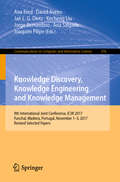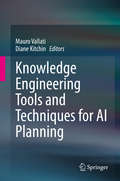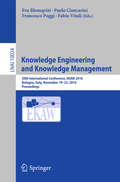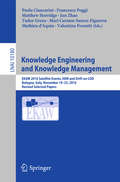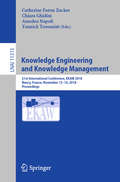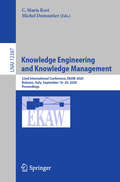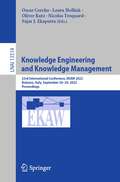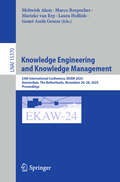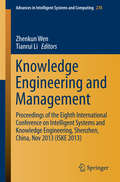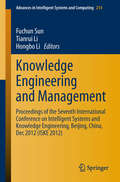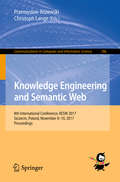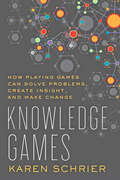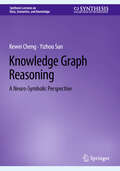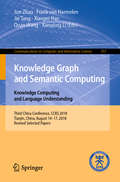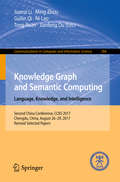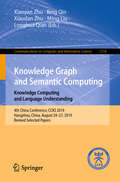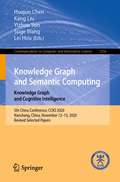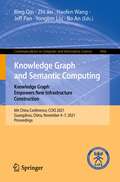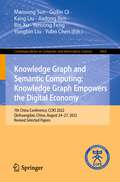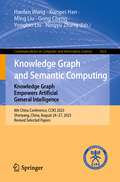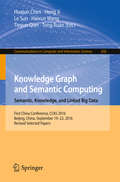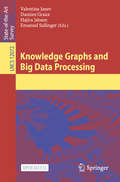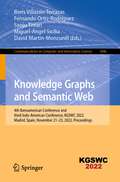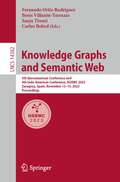- Table View
- List View
Knowledge Discovery, Knowledge Engineering and Knowledge Management: 9th International Joint Conference, IC3K 2017, Funchal, Madeira, Portugal, November 1-3, 2017, Revised Selected Papers (Communications in Computer and Information Science #976)
by David Aveiro Joaquim Filipe Kecheng Liu Ana Fred Jorge Bernardino Jan L. Dietz Ana SalgadoThis book constitutes the thoroughly refereed proceedings of the 8th International Joint Conference on Knowledge Discovery, Knowledge Engineering and Knowledge Management, IC3K 2017, held in Funchal, Madeira, Portugal, in November 2017.The 19 full papers presented were carefully reviewed and selected from 157 submissions. The papers are organized in topical sections on knowledge discovery and information retrieval; knowledge engineering and ontology development; and knowledge management and information sharing.
Knowledge Engineering Tools and Techniques for AI Planning
by Mauro Vallati Diane KitchinThis book presents a comprehensive review for Knowledge Engineering tools and techniques that can be used in Artificial Intelligence Planning and Scheduling. KE tools can be used to aid in the acquisition of knowledge and in the construction of domain models, which this book will illustrate. AI planning engines require a domain model which captures knowledge about how a particular domain works - e.g. the objects it contains and the available actions that can be used. However, encoding a planning domain model is not a straightforward task - a domain expert may be needed for their insight into the domain but this information must then be encoded in a suitable representation language. The development of such domain models is both time-consuming and error-prone. Due to these challenges, researchers have developed a number of automated tools and techniques to aid in the capture and representation of knowledge.This book targets researchers and professionals working in knowledge engineering, artificial intelligence and software engineering. Advanced-level students studying AI will also be interested in this book.
Knowledge Engineering and Knowledge Management
by Francesco Poggi Paolo Ciancarini Eva Blomqvist Fabio VitaliThis book constitutes the refereed proceedings of the 20th International Conference on Knowledge Engineering and Knowledge Management, EKAW 2016, held in Bologna, Italy, in November 2016. The 51 full papers presented were carefully reviewed and selected from 171 submissions. The papers cover all aspects of eliciting, acquiring, modeling, and managing knowledge, the construction of knowledge-intensive systems and services for the Semantic Web, knowledge management, e-business, natural language processing, intelligent information integration, personal digital assistance systems, and a variety of other related topics. A special focus was on "evolving knowledge", i. e. , the impact of space and time on knowledge representation, concerning all aspects of the management and acquisition of knowledge representation of evolving, contextual, and local models.
Knowledge Engineering and Knowledge Management
by Francesco Poggi Valentina Presutti Mathieu D'Aquin Paolo Ciancarini Matthew Horridge Jun Zhao Tudor Groza Mari Carmen Suarez-FigueroaThis book contains the best selected papers of two Satellite Events held at the 20th International Conference on Knowledge Engineering and Knowledge Management, EKAW 2016, in November 2016 in Bologna, Italy: The Second International Workshop on Educational Knowledge Management, EKM 2016, and the First Workshop: Detection, Representation and Management of Concept Drift in Linked Open Data, Drift-an-LOD 2016. The 6 revised full papers included in this volume were carefully reviewed and selected from the 13 full papers that were accepted for presentation at the conference from the initial 82 submissions. This volume also contains the 37 accepted contributions for the EKAW 2016 tutorials, demo and poster sessions, and the doctoral consortium. The special focus of this year's EKAW was "evolving knowledge", which concerns all aspects of the management and acquisition of knowledge representations of evolving, contextual, and local models. This includes change management, trend detection, model evolution, streaming data and stream reasoning, event processing, time-and space dependent models, contextual and local knowledge representations with a special emphasis on the evolvability and localization of knowledge and the correct usage of these limits.
Knowledge Engineering and Knowledge Management: 20th International Conference, EKAW 2016, Bologna, Italy, November 19-23, 2016, Proceedings (Lecture Notes in Computer Science #10024)
by Eva Blomqvist, Paolo Ciancarini, Francesco Poggi and Fabio VitaliThis book constitutes the refereed proceedings of the 20th InternationalConference on Knowledge Engineering and Knowledge Management, EKAW 2016,held in Bologna, Italy, in November 2016.The 51 full papers presented were carefully reviewed and selected from 171 submissions. The papers cover all aspects of eliciting, acquiring, modeling, and managing knowledge, the construction of knowledge-intensive systems and services for the Semantic Web, knowledge management, e-business, natural language processing,intelligent information integration, personal digital assistance systems, and a variety of other related topics. A special focus was on "evolving knowledge", i.e., the impact of space and time on knowledge representation, concerning all aspects of the management and acquisition of knowledge representation of evolving, contextual, and local models.
Knowledge Engineering and Knowledge Management: 21st International Conference, EKAW 2018, Nancy, France, November 12-16, 2018, Proceedings (Lecture Notes in Computer Science #11313)
by Catherine Faron Zucker Chiara Ghidini Amedeo Napoli Yannick ToussaintThis book constitutes the refereed proceedings of the 21th International Conference on Knowledge Engineering and Knowledge Management, EKAW 2018, held in Nancy, France, in November 2018. The 36 full papers presented were carefully reviewed and selected from 104 submissions. The papers cover all aspects of eliciting, acquiring, modeling, and managing knowledge, the construction of knowledge-intensive systems and services for the Semantic Web, knowledge management, e-business, natural language processing, intelligent information integration, personal digital assistance systems, and a variety of other related topics. A special focus was on "Knowledge and AI", i.e. papers describing algorithms, tools, methodologies, and applications that exploit the interplay between knowledge and Artificial Intelligence techniques, with a special emphasis on knowledge discovery.
Knowledge Engineering and Knowledge Management: 22nd International Conference, EKAW 2020, Bolzano, Italy, September 16–20, 2020, Proceedings (Lecture Notes in Computer Science #12387)
by Michel Dumontier C. Maria KeetThis book constitutes the refereed proceedings of the 22nd International Conference on Knowledge Engineering and Knowledge Management, EKAW 2020, held in Bolzano, Italy, in September 2020. The 12 full papers presented together with 7 were carefully reviewed and selected from 104 submissions. The special theme of EKAW 2020 is „Ethical and Trustworthy Knowledge Engineering". The papers cover all aspects of eliciting, acquiring, discovering, modeling, and managing knowledge and construction of knowledge-intensive systems.
Knowledge Engineering and Knowledge Management: 23rd International Conference, EKAW 2022, Bolzano, Italy, September 26–29, 2022, Proceedings (Lecture Notes in Computer Science #13514)
by Oscar Corcho Laura Hollink Oliver Kutz Nicolas Troquard Fajar J. EkaputraThis book constitutes the refereed proceedings of the 23rd International Conference on Knowledge Engineering and Knowledge Management, EKAW 2022, held in Bolzano, Italy, in September 2022. The 11 full papers presented together with 5 short papers were carefully reviewed and selected from 57 submissions The previous event in the series, EKAW 2020, introduced a special theme related to “Ethical and Trustworthy Knowledge Engineering.” This theme is still very relevant in 2022, and thus has remained one of the core topics of the conference.The conference concerned with all aspects about eliciting, acquiring, modeling and managing knowledge, and the construction of knowledge-intensive systems and services for the semantic web, knowledge management, e-business, natural language processing, intelligent information integration, and much more.
Knowledge Engineering and Knowledge Management: 24th International Conference, EKAW 2024, Amsterdam, The Netherlands, November 26–28, 2024, Proceedings (Lecture Notes in Computer Science #15370)
by Marieke Van Erp Laura Hollink Mehwish Alam Marco Rospocher Genet Asefa GeseseThis book constitutes the refereed proceedings of the 24th International Conference on Knowledge Engineering and Knowledge Management, EKAW 2024, held in Amsterdam, The Netherlands, during November 26–28, 2024. The 28 full papers presented together were carefully reviewed and selected from 115 submissions. They focus on all aspects of knowledge in constructing systems and services for the semantic web, knowledge management, knowledge discovery, information integration, natural language processing, intelligent systems, e-business, e-health, humanities, cultural heritage, and beyond.
Knowledge Engineering and Management
by Tianrui Li Zhenkun Wen"Knowledge Engineering and Management" presents selected papers from the 2013 International Conference on Intelligent Systems and Knowledge Engineering (ISKE2013). The aim of this conference is to bring together experts from different expertise areas to discuss the state-of-the-art in Intelligent Systems and Knowledge Engineering, and to present new research results and perspectives on future development. The topics in this volume include, but not limited to: Knowledge Representation and Modeling, Knowledge Maintenance, Knowledge Elicitation, Knowledge-Based Systems (KBS), Content Management and Knowledge Management Systems, Ontology Engineering, Data Mining and Knowledge Discovery, Knowledge Acquisition, etc. The proceedings are benefit for both researchers and practitioners who want to utilize knowledge engineering methods in their specific research fields. Dr. Zhenkun Wen is a Professor at the College of Computer and Software Engineering, Shenzhen University, China. Dr. Tianrui Li is a Professor at the School of Information Science and Technology, Southwest Jiaotong University, Xi'an, China.
Knowledge Engineering and Management: Proceedings of the Seventh International Conference on Intelligent Systems and Knowledge Engineering, Beijing, China, Dec 2012 (ISKE #2012)
by Tianrui Li Hongbo Li Fuchun SunThese proceedings present technical papers selected from the 2012 International Conference on Intelligent Systems and Knowledge Engineering (ISKE 2012), held on December 15-17 in Beijing. The aim of this conference is to bring together experts from different fields of expertise to discuss the state-of-the-art in Intelligent Systems and Knowledge Engineering, and to present new findings and perspectives on future developments. The proceedings introduce current scientific and technical advances in the fields of artificial intelligence, machine learning, pattern recognition, data mining, knowledge engineering, information retrieval, information theory, knowledge-based systems, knowledge representation and reasoning, multi-agent systems, and natural-language processing, etc. Furthermore they include papers on new intelligent computing paradigms, which combine new computing methodologies, e.g., cloud computing, service computing and pervasive computing with traditional intelligent methods. By presenting new methodologies and practices, the proceedings will benefit both researchers and practitioners who want to utilize intelligent methods in their specific fields. Dr. Fuchun Sun is a professor at the Department of Computer Science & Technology, Tsinghua University, China. Dr. Tianrui Li is a professor at the School of Information Science & Technology, Southwest Jiaotong University, Chengdu, China. Dr. Hongbo Li also works at the Department of Computer Science & Technology, Tsinghua University, China.
Knowledge Engineering and Semantic Web: 8th International Conference, KESW 2017, Szczecin, Poland, November 8-10, 2017, Proceedings (Communications in Computer and Information Science #786)
by Przemysław Różewski and Christoph LangeThis book constitutes the refereed proceedings of the 8th International Conference on Knowledge Engineering and the Semantic Web, KESW 2017, held Szczecin, Poland, in November 2017. The 16 full papers presented were carefully reviewed and selected from 58 submissions. The papers are organized in topical sections on natural language processing; knowledge representation and reasoning; ontologies and controlled vocabularies; scalable data access and storage solutions; semantic Web and education; linked data; semantic technologies in manufacturing and business.
Knowledge Games: How Playing Games Can Solve Problems, Create Insight, and Make Change (Tech.edu: A Hopkins Series on Education and Technology)
by Karen SchrierAre games the knowledge-producers of the future?Imagine if new knowledge and insights came not just from research centers, think tanks, and universities but also from games, of all things. Video games have been viewed as causing social problems, but what if they actually helped solve them? This question drives Karen Schrier’s Knowledge Games, which seeks to uncover the potentials and pitfalls of using games to make discoveries, solve real-world problems, and better understand our world. For example, so-called knowledge games—such as Foldit, a protein-folding puzzle game, SchoolLife, which crowdsources bullying interventions, and Reverse the Odds, in which mobile game players analyze breast cancer data—are already being used by researchers to gain scientific, psychological, and humanistic insights.Schrier argues that knowledge games are potentially powerful because of their ability to motivate a crowd of problem solvers within a dynamic system while also tapping into the innovative data processing and computational abilities of games. In the near future, Schrier asserts, knowledge games may be created to understand and predict voting behavior, climate concerns, historical perspectives, online harassment, susceptibility to depression, or optimal advertising strategies, among other things.In addition to investigating the intersection of games, problem solving, and crowdsourcing, Schrier examines what happens when knowledge emerges from games and game players rather than scientists, professionals, and researchers. This accessible book also critiques the limits and implications of games and considers how they may redefine what it means to produce knowledge, to play, to educate, and to be a citizen.
Knowledge Graph Reasoning: A Neuro-Symbolic Perspective (Synthesis Lectures on Data, Semantics, and Knowledge)
by Yizhou Sun Kewei ChengThis book provides a coherent and unifying view for logic and representation learning to contribute to knowledge graph (KG) reasoning and produce better computational tools for integrating both worlds. To this end, logic and deep neural network models are studied together as integrated models of computation. This book is written for readers who are interested in KG reasoning and the new perspective of neuro-symbolic integration and have prior knowledge to neural networks and deep learning. The authors first provide a preliminary introduction to logic and background knowledge closely related to the surveyed techniques such as the introduction of knowledge graph and ontological schema and the technical foundations of first-order logic learning. Reasoning techniques for knowledge graph completion are presented from three perspectives, including: representation learning-based, logical, and neuro-symbolic integration. The book then explores question answering on KGs with specific focus on multi-hop and complex-logic query answering before outlining work that addresses the rule learning problem. The final chapters highlight foundations on ontological schema and introduce its usage in KG before closing with open research questions and a discussion on the potential directions in the future of the field.
Knowledge Graph and Semantic Computing. Knowledge Computing and Language Understanding: Third China Conference, CCKS 2018, Tianjin, China, August 14–17, 2018, Revised Selected Papers (Communications in Computer and Information Science #957)
by Frank Van Harmelen Quan Wang Jun Zhao Jie Tang Xianpei Han Xianyong LiThis book constitutes the refereed proceedings of the Third China Conference on Knowledge Graph and Semantic Computing, CCKS 2018, held in Tianjin, China, in August 2018.The 27 revised full papers and 2 revised short papers presented were carefully reviewed and selected from 101 submissions. The papers cover wide research fields including the knowledge graph, information extraction, knowledge representation and reasoning, linked data.
Knowledge Graph and Semantic Computing. Language, Knowledge, and Intelligence
by Ming Zhou Guilin Qi Juanzi Li Jianfeng Du Tong Ruan Ni LaoThis book constitutes the refereed proceedings of the Second China Conference on Knowledge Graph and Semantic Computing, CCKS 2017, held in Chengdu, China, in August 2017. The 11 revised full papers and 6 revised short papers presented were carefully reviewed and selected from 85 submissions. The papers cover wide research fields including the knowledge graph, the Semantic Web, linked data, NLP, knowledge representation, graph databases.
Knowledge Graph and Semantic Computing: 4th China Conference, CCKS 2019, Hangzhou, China, August 24–27, 2019, Revised Selected Papers (Communications in Computer and Information Science #1134)
by Xiaoyan Zhu Ming Liu Bing Qin Xiaodan Zhu Longhua QianThis book constitutes the refereed proceedings of the 4th China Conference on Knowledge Graph and Semantic Computing, CCKS 2019, held in Hangzhou, China, in August 2019. The 18 revised full papers presented were carefully reviewed and selected from 140 submissions. The papers cover wide research fields including the knowledge graph, the semantic Web, linked data, NLP, information extraction, knowledge representation and reasoning.
Knowledge Graph and Semantic Computing: 5th China Conference, CCKS 2020, Nanchang, China, November 12–15, 2020, Revised Selected Papers (Communications in Computer and Information Science #1356)
by Huajun Chen Yizhou Sun Kang Liu Suge Wang Lei HouThis book constitutes the refereed proceedings of the 5th China Conference on Knowledge Graph and Semantic Computing, CCKS 2020, held in Nanchang, China, in November 2020. The 26 revised full papers presented were carefully reviewed and selected from 173 submissions. The papers are organized in topical sections on knowledge extraction: lexical and entity; knowledge extraction: relation; knowledge extraction: event; knowledge applications: question answering, dialogue, decision support, and recommendation.
Knowledge Graph and Semantic Computing: 6th China Conference, CCKS 2021, Guangzhou, China, November 4-7, 2021, Proceedings (Communications in Computer and Information Science #1466)
by Bo An Haofen Wang Zhi Jin Bing Qin Jeff Pan Yongbin LiuThis book constitutes the refereed proceedings of the 6th China Conference on Knowledge Graph and Semantic Computing, CCKS 2021, held in Guangzhou, China, in November 2021. The 19 revised full papers and 9 short papers presented were carefully reviewed and selected from 170 submissions. The papers are organized in topical sections on knowledge extraction: knowledge graph representation and reasoning; knowledge acquisition and knowledge graph construction; linked data, knowledge integration, and knowledge graph storage management; natural language understanding and semantic computing; knowledge graph applications: semantic search, question answering, dialogue, decision support, and recommendation; knowledge graph open resources.
Knowledge Graph and Semantic Computing: 7th China Conference, CCKS 2022, Qinhuangdao, China, August 24–27, 2022, Revised Selected Papers (Communications in Computer and Information Science #1669)
by Guilin Qi Maosong Sun Yansong Feng Bin Xu Kang Liu Yongbin Liu Yubo Chen Jiadong RenThis book constitutes the refereed proceedings of the 7th China Conference on Knowledge Graph and Semantic Computing: Knowledge Graph Empowers the Digital Economy, CCKS 2022, in Qinhuangdao, China, August 24–27, 2022.The 15 full papers and 2 short papers included in this book were carefully reviewed and selected from 100 submissions. They were organized in topical sections as follows: knowledge representation and reasoning; knowledge acquisition and knowledge base construction; linked data, knowledge integration, and knowledge graph storage managements; natural language understanding and semantic computing; knowledge graph applications; and knowledge graph open resources.
Knowledge Graph and Semantic Computing: 8th China Conference, CCKS 2023, Shenyang, China, August 24–27, 2023, Revised Selected Papers (Communications in Computer and Information Science #1923)
by Haofen Wang Ming Liu Xianpei Han Yongbin Liu Ningyu Zhang Gong ChengThis book constitutes the refereed proceedings of the 8th China Conference on Knowledge Graph and Semantic Computing: Knowledge Graph Empowers Artificial General Intelligence, CCKS 2023, held in Shenyang, China, during August 24–27, 2023. The 28 full papers included in this book were carefully reviewed and selected from 106 submissions. They were organized in topical sections as follows: knowledge representation and knowledge graph reasoning; knowledge acquisition and knowledge base construction; knowledge integration and knowledge graph management; natural language understanding and semantic computing; knowledge graph applications; knowledge graph open resources; and evaluations.
Knowledge Graph and Semantic Computing: Semantic, Knowledge, and Linked Big Data
by Huajun Chen Tieyun Qian Haixun Wang Heng Ji Le Sun Tong RuanThis book constitutes the refereed proceedings of the first China Conference on Knowledge Graph and Semantic Computing, CCKS, held in Beijing, China, in September 2016. The 19 revised full papers presented together with 6 shared tasks were carefully reviewed and selected from numerous submissions. The papers are organized in topical sections on knowledge representation and learning; knowledge graph construction and information extraction; linked data and knowledge-based systems; shared tasks.
Knowledge Graphs and Big Data Processing (Lecture Notes in Computer Science #12072)
by Valentina Janev Damien Graux Hajira Jabeen Emanuel SallingerThis open access book is part of the LAMBDA Project (Learning, Applying, Multiplying Big Data Analytics), funded by the European Union, GA No. 809965. Data Analytics involves applying algorithmic processes to derive insights. Nowadays it is used in many industries to allow organizations and companies to make better decisions as well as to verify or disprove existing theories or models. The term data analytics is often used interchangeably with intelligence, statistics, reasoning, data mining, knowledge discovery, and others. The goal of this book is to introduce some of the definitions, methods, tools, frameworks, and solutions for big data processing, starting from the process of information extraction and knowledge representation, via knowledge processing and analytics to visualization, sense-making, and practical applications. Each chapter in this book addresses some pertinent aspect of the data processing chain, with a specific focus on understanding Enterprise Knowledge Graphs, Semantic Big Data Architectures, and Smart Data Analytics solutions. This book is addressed to graduate students from technical disciplines, to professional audiences following continuous education short courses, and to researchers from diverse areas following self-study courses. Basic skills in computer science, mathematics, and statistics are required.
Knowledge Graphs and Semantic Web: 4th Iberoamerican Conference and third Indo-American Conference, KGSWC 2022, Madrid, Spain, November 21–23, 2022, Proceedings (Communications in Computer and Information Science #1686)
by Boris Villazón-Terrazas Miguel-Angel Sicilia Sanju Tiwari Fernando Ortiz-Rodriguez David Martín-MoncunillThis book constitutes the proceedings of the 4th Iberoamerican Conference and third Indo-American Conference on Knowledge Graphs and Semantic Web, KGSWC 2022, which took place in Madrid, Spain, in November 2022.The 22 full and 3 short research papers presented in this volume were carefully reviewed and selected from 63 submissions. The papers cover topics related to software and its engineering, software creation and management, Emerging technologies, Analysis and design of emerging devices and systems, Emerging tools and methodologies and others.
Knowledge Graphs and Semantic Web: 5th Iberoamerican Conference and 4th Indo-American Conference, KGSWC 2023, Zaragoza, Spain, November 13–15, 2023, Proceedings (Lecture Notes in Computer Science #14382)
by Boris Villazón-Terrazas Sanju Tiwari Fernando Ortiz-Rodriguez Carlos BobedThis book constitutes the refereed proceedings of the 5th Iberoamerican Conference and 4th Indo-American Conference on Knowledge Graphs and Semantic Web, KGSWC 2023, held jointly in Zaragoza, Spain, during November 13–15, 2023.The 18 full and 2 short papers presented were carefully reviewed and selected from 50 submissions. They focus on the following topics: knowledge representation; natural language processing/text mining; and machine/deep learning research.
